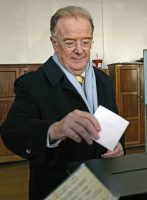Former Portuguese President Jorge Sampaio, who made national history in 2005 with extraordinary use of his powers to dissolve parliament and oust an unstable majority government, died on Friday at the age of 81. The cause of death was not disclosed, though Sampaio had been hospitalized since Aug. 27 with breathing difficulties.
After an uneventful first term in 1996-2001, the affable Socialist former lawyer won another five-year mandate that turned out to be more turbulent and showed the might of presidential powers in what is usually a ceremonial office.
With the budget deficit rising and Portugal teetering on the verge of recession, the Socialists lost a snap parliamentary election in 2002 to a center-right coalition of the Social Democrats and the People’s Party.

In 2004, Sampaio’s refusal to hold an early election after Jose Manuel Durao Barroso resigned as prime minister to lead the European Commission triggered fierce protests from left-leaning parties including the Socialists.
In an attempt to ensure political stability, he named another Social Democrat, Pedro Santana Lopes, as premier, only to conclude four months later that the new cabinet was not achieving the desired results and lacked overall credibility.
He used his presidential powers, often dubbed the Atomic Bomb in Portugal, to break up parliament and call new elections for February 2005, which brought the Socialists back to the helm under Prime Minister Jose Socrates.
In his biography, Sampaio told the author, Jose Pedro Castanheira, that he was “fed up with Santana Lopes as prime minister as he was leaving the country adrift.”
He was the only president to have ever used that power while a government with a parliamentary majority ruled Portugal.

 Entertainment1 week ago
Entertainment1 week ago
 Entertainment5 days ago
Entertainment5 days ago
 Comments and Issues1 week ago
Comments and Issues1 week ago
 Comments and Issues1 week ago
Comments and Issues1 week ago
 Business1 week ago
Business1 week ago
 Health6 days ago
Health6 days ago
 Comments and Issues1 week ago
Comments and Issues1 week ago
 Football6 days ago
Football6 days ago


